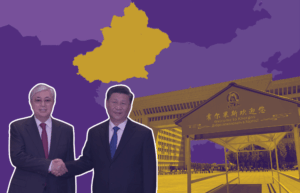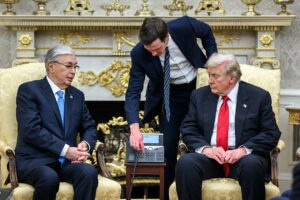China’s involvement in the race for vaccinations in Central Asia confirms its aim to increase relations with neighbouring countries, primed for over a decade with the New Silk Road project. However, resistance among citizens continues to slow Chinese ambitions. This article was originally published on Novastan’s French website on 1st of March 2021. While the development of Coronavirus vaccinations takes a strategic turn, China plays its hand in Central Asia. According to the Chinese press agency Xinhue, Beijing pledged to provide doses of the Chinese Sinopharm vaccines to Kyrgyzstan on the 5th of February 2021, the first case of such an offer worldwide. At the same time, Uzbekistan began testing of another Chinese vaccination, developed by Anhui Zhifei Longcom. The trials launched in November 2020 and are set to continue until May 2021. Radio Ozodlik, the Uzbek branch of the American media Radio Free Europe, confirmed that Tashkent could even share co-authorship of the Chinese vaccine as they plan to produce it. Read More on Novastan : Mass Vaccination Programme Starts in Uzbekistan Diplomacy surrounding vaccinations is particularly delicate in Central Asia, where Russia and China both try to promote their respective vaccinations as a part of their competition for regional dominance. The Russian vaccination Sputnik V has been chosen by the Uzbek, Kazakh and Kyrgyz authorities for their mass vaccination programs. Read More on Novastan: Covid-19: Kazakhstan Starts Rollout of its QazVac jab The race to deliver vaccinations is not, however, the only outcome of the current health crisis: the economic situation in Central Asian countries is rapidly deteriorating due to the shrinking global economy. This is particularly true for Turkmenistan, a country that depends almost entirely on oil exports, China being their main buyer. However, China’s decreased oil demand, which is linked to the pandemic, has destabilised this unique source of foreign income for Turkmenistan. The country’s difficulty of exporting oil has paradoxically led to closer relations between the two countries, as Ashgabat depends more than ever on Chinese imports.
The New Silk Road
The new strategy is only the latest in a long list. In an interview with French media Le Monde, researcher Niva Yau describes China’s strategy in Central Asia, which has long favoured importation of mineral and energy sources from Central Asian countries to meet the extremely high demands of the Chinese economic system. Certain Central Asian countries have therefore adapted their production to satisfy Chinese demand, especially oil production. Both Turkmenistan and Uzbekistan are an example of this, two countries whose oil exportation is largely dependent on Chinese demand.
The New Silk Road project, launched in 2013 in Astana, aims to create rail links between China and Europe, as well as seeks to promote cooperation within Eurasia. According to Niva Yau, China intends to work towards strengthening oil infrastructure in Turkmenistan and gas infrastructure in Kazakhstan. Nevertheless, China’s strategy is not limited to simply building new infrastructure. In 2013, China launched a program to outsource their industrial capacities, aiming to share industry expertise with the countries of Central Asia. What’s more, several Central Asian cities use Chinese ‘smart city’ technology, developed by Huawei, which aims to control populations with security cameras. In the Tajik capital Dushanbe, for example, there are over 800 of these cameras in operation. American media Eurasianet reported that other than outsourcing industrial expertise, China aims to gradually open its market to the countries of Central Asia, thus demonstrating new interest in this area. Indeed, since 2019, Beijing has signed numerous agreements relating to agrochemical standards, approving importation of food items, and even encouraging Central Asia businesses to enter the Chinese market. Kazakh media Astana Times reported that in September 2019, Kazakhstan’s president Kassym-Jomart Tokayev promised a three-time increase in wheat exports to China as a response to China’s gestures. Similarly, in September 2020, Uzbek president Shavkat Mirziyoyev promised a fivefold increase in food exports. However, two hurdles remain before entering the Chinese market, according to Eurasianet: while China is an ultra-competitive market, the Central Asian countries would have to improve their border infrastructure and logistical systems in order to transport their goods to China at a low cost.
China’s Presence in Central Asia is Highly Contested
Opinions in Central Asia remain divided when it comes to China’s increased presence. Researcher Niva Yau states that several anti-Chinese protests have taken place, particularly over the past few years. Le Monde reminds readers that Kyrgyzstan in particular has been the stage of anti-Chinese sentiment, exemplified by the cancellation of a project to create a Chinese logistical centre in At Bashy in February 2020. In February 2019, several demonstrations organized by Kyrk Shoro, a nationalist movement, undermined local Kyrgyz authorities. Sinophobia is equally present in Kazakhstan, a Central Asian country heavily implicated in the New Silk Road project with Khorgos, their free trade zone. These movements are obstacles to China’s strategy, which needs full cooperation and loyal allies in the long term. Niva Yau notes that Central Asians are generally opposed to Chinese projects on their territory because of the policies linked to Chinese investment. These policies benefit local governments but leave local communities behind because of the total absence of redistribution of wealth by the ruling elite. In this regard, the diplomatic push for vaccines is unlikely to have any effect.
Corentin Goupil Editor of Novastan
Translated from French by Alice Coveney
Edited by Dagmar Nared
For more news and analysis from Central Asia, follow us on Twitter, Facebook, Telegram, Linkedin or Instagram.
 Coronavirus in Central Asia: An Opportunity for China?
Coronavirus in Central Asia: An Opportunity for China? 



